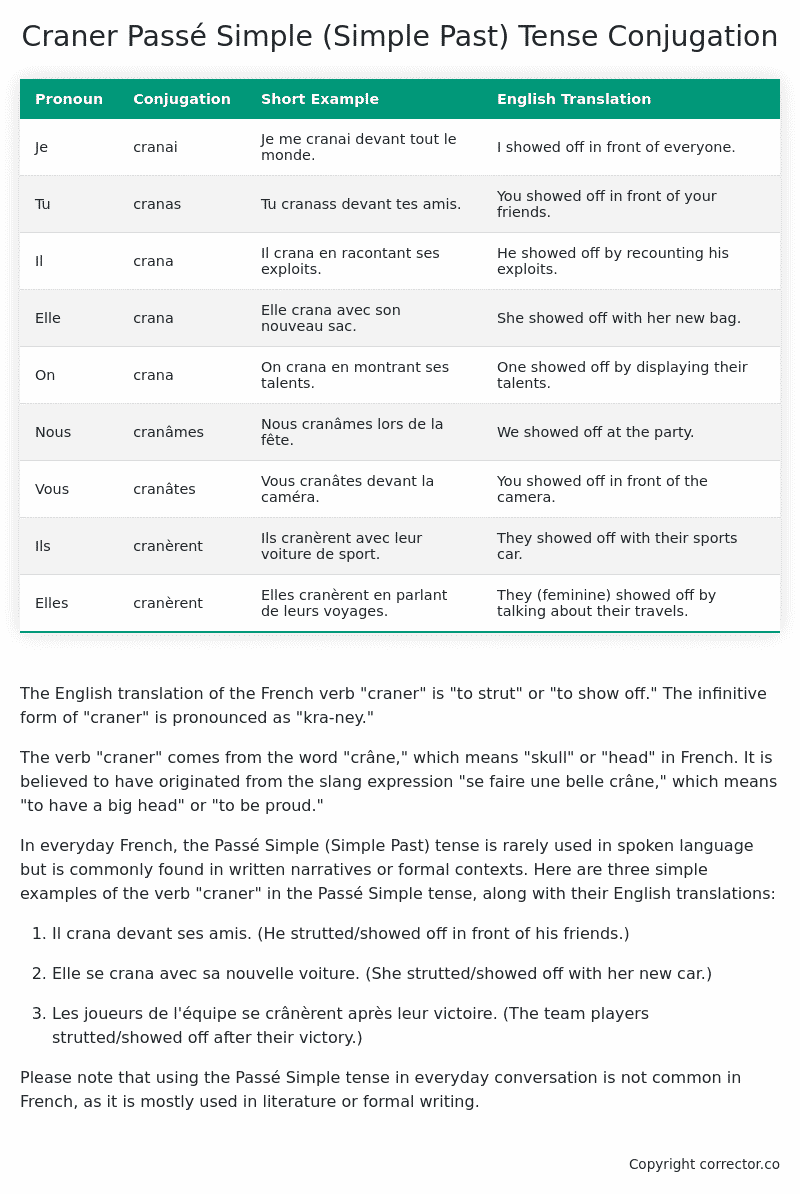Passé Simple (Simple Past) Tense Conjugation of the French Verb craner
Introduction to the verb craner
The English translation of the French verb “craner” is “to strut” or “to show off.” The infinitive form of “craner” is pronounced as “kra-ney.”
The verb “craner” comes from the word “crâne,” which means “skull” or “head” in French. It is believed to have originated from the slang expression “se faire une belle crâne,” which means “to have a big head” or “to be proud.”
In everyday French, the Passé Simple (Simple Past) tense is rarely used in spoken language but is commonly found in written narratives or formal contexts. Here are three simple examples of the verb “craner” in the Passé Simple tense, along with their English translations:
-
Il crana devant ses amis.
(He strutted/showed off in front of his friends.) -
Elle se crana avec sa nouvelle voiture.
(She strutted/showed off with her new car.) -
Les joueurs de l’équipe se crânèrent après leur victoire.
(The team players strutted/showed off after their victory.)
Please note that using the Passé Simple tense in everyday conversation is not common in French, as it is mostly used in literature or formal writing.
Table of the Passé Simple (Simple Past) Tense Conjugation of craner
| Pronoun | Conjugation | Short Example | English Translation |
|---|---|---|---|
| Je | cranai | Je me cranai devant tout le monde. | I showed off in front of everyone. |
| Tu | cranas | Tu cranass devant tes amis. | You showed off in front of your friends. |
| Il | crana | Il crana en racontant ses exploits. | He showed off by recounting his exploits. |
| Elle | crana | Elle crana avec son nouveau sac. | She showed off with her new bag. |
| On | crana | On crana en montrant ses talents. | One showed off by displaying their talents. |
| Nous | cranâmes | Nous cranâmes lors de la fête. | We showed off at the party. |
| Vous | cranâtes | Vous cranâtes devant la caméra. | You showed off in front of the camera. |
| Ils | cranèrent | Ils cranèrent avec leur voiture de sport. | They showed off with their sports car. |
| Elles | cranèrent | Elles cranèrent en parlant de leurs voyages. | They (feminine) showed off by talking about their travels. |
Other Conjugations for Craner.
Le Present (Present Tense) Conjugation of the French Verb craner
Imparfait (Imperfect) Tense Conjugation of the French Verb craner
Passé Simple (Simple Past) Tense Conjugation of the French Verb craner (You’re reading it right now!)
Passé Composé (Present Perfect) Tense Conjugation of the French Verb craner
Futur Simple (Simple Future) Tense Conjugation of the French Verb craner
Futur Proche (Near Future) Tense Conjugation of the French Verb craner
Plus-que-parfait (Pluperfect) Tense Conjugation of the French Verb craner
Passé Antérieur (Past Anterior) Tense Conjugation of the French Verb craner
Futur Antérieur (Future Anterior) Tense Conjugation of the French Verb craner
Subjonctif Présent (Subjunctive Present) Tense Conjugation of the French Verb craner
Subjonctif Passé (Subjunctive Past) Tense Conjugation of the French Verb craner
Subjonctif Imparfait (Subjunctive Imperfect) Tense Conjugation of the French Verb craner
Subjonctif Plus-que-parfait (Subjunctive Pluperfect) Tense Conjugation of the French Verb craner
Conditionnel Présent (Conditional Present) Tense Conjugation of the French Verb craner
Conditionnel Passé (Conditional Past) Tense Conjugation of the French Verb craner
Conditionnel Passé II (Conditional Past II) Tense Conjugation of the French Verb craner
L’impératif Présent (Imperative Present) Tense Conjugation of the French Verb craner
L’impératif Passé (Imperative Past) Tense Conjugation of the French Verb craner
L’infinitif Présent (Infinitive Present) Tense Conjugation of the French Verb craner
L’infinitif Passé (Infinitive Past) Tense Conjugation of the French Verb craner
Le Participe Présent (Present Participle) Tense Conjugation of the French Verb craner
Le Participe Passé (Past Participle) Tense Conjugation of the French Verb craner
Struggling with French verbs or the language in general? Why not use our free French Grammar Checker – no registration required!
Get a FREE Download Study Sheet of this Conjugation 🔥
Simply right click the image below, click “save image” and get your free reference for the craner Passé Simple tense conjugation!

Craner – About the French Passé Simple (Simple Past) Tense
Formation
Usage
Narration
Historical Context
Interactions with other tenses
Passé Composé
Imparfait
Conditional and Subjunctive
Summary
I hope you enjoyed this article on the verb craner. Still in a learning mood? Check out another TOTALLY random French verb conjugation!


